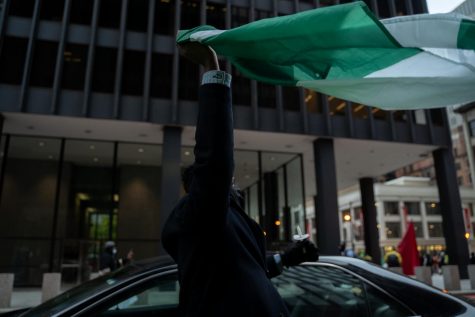Opinion: Why Black issues abroad should matter in the U.S.
February 17, 2021

In 2013, shortly after the emergence of the Black Lives Matter movement and the killing of Trayvon Martin, I developed a sense of urgency for justice in the countless number of police brutality cases and deaths of unarmed Black people at the hands of police officers.
For centuries, African Americans have not had a strong understanding of or connection to their ancestral identities due to forced cultural erasure.
After I witnessed and participated in community activism through marches and die-ins demanding justice in the wrongful killing of Black people in the U.S., I sought to find out more about my roots through a DNA test from Ancestry.com.
My Ancestry.com results found a high percentage of my DNA tracing back to Cameroon. While this discovery led me to ties with Cameroonian people already within my community, it also helped me to connect Black issues faced in the U.S. to those faced in Cameroon.
Knowing about one’s ancestry is a privilege only recently made available to Black Americans through services like 23 and Me and Ancestry.com and should be embraced with pride in preserving the hardships faced by one’s predecessors. Before these services, ancestry paper trails had to be found arbitrarily through taxes and slave purchase records, according to the Washington Post.
Learning about my family’s Cameroonian heritage provided a larger context for me to think about the trauma of slavery my ancestors experienced. My family history means more than the surnames owners of enslaved people gave my ancestors; it means we have a history that goes beyond slavery, which gives us autonomy.
During my research, I came across the present Cameroonian Civil War, also known as the Anglophone Crisis, which began in September 2017 over the oppression of English-speaking Cameroonians who generally lack government representation from high-ranking officials who also speak English, and French Cameroonian laws that were being forced on them. I was shocked that there was a lack of kinship between Cameroonian tribes due to a difference in language, mostly because Black people globally are connected through a diaspora.
While Black activists protest the murders of their community members, English-speaking Cameroonians fought for their civil rights due to the lack of legal representation and a government that does not reflect their values.
This fight for equality created division in Cameroon because there is a strong sense of tribalism between different regions, with around 80% of the country able to speak French and the rest of the population only fluent in English or other languages. It is different when language as a barrier is a byproduct of colonization, compared to having a shared heritage of enslaved ancestors brought to an English-speaking country.
Dr. Martin Luther King Jr. once said: “Injustice anywhere is a threat to justice everywhere. We are caught in an inescapable network of mutuality, tied in a single garment of destiny. Whatever affects one directly, affects all indirectly.”
This quote is a relevant mantra Black people should consider when hearing about the international oppression other Black people face. Black Americans should advocate for peace between both sides of Cameroon because we should be unified instead of killing each other. The French and the English sides should work together to have joint representation and an inclusive government because they are part of the same nation.
And although we are separated by oceans, Black people are able to reach out internationally to help others. For example, Ronald Dellums, former congressman from California, worked to expose the inhumanity and injustice of apartheid, a system of longterm segregation, in South Africa, according to a VOA News article. Dellums’ efforts led to protests held by other African Americans to advocate for an end to segregation.
Incidents like this of successful international cooperation to end segregation in Africa are proof that Black alliances against oppression can be victorious. Despite geographical separation, Black people are globally taking up the Black Lives Matter movement, and we should continue to do so today by supporting those on different continents.
It may seem that culture and language divide Black people from each other, but our shared heritage is what truly connects us.







